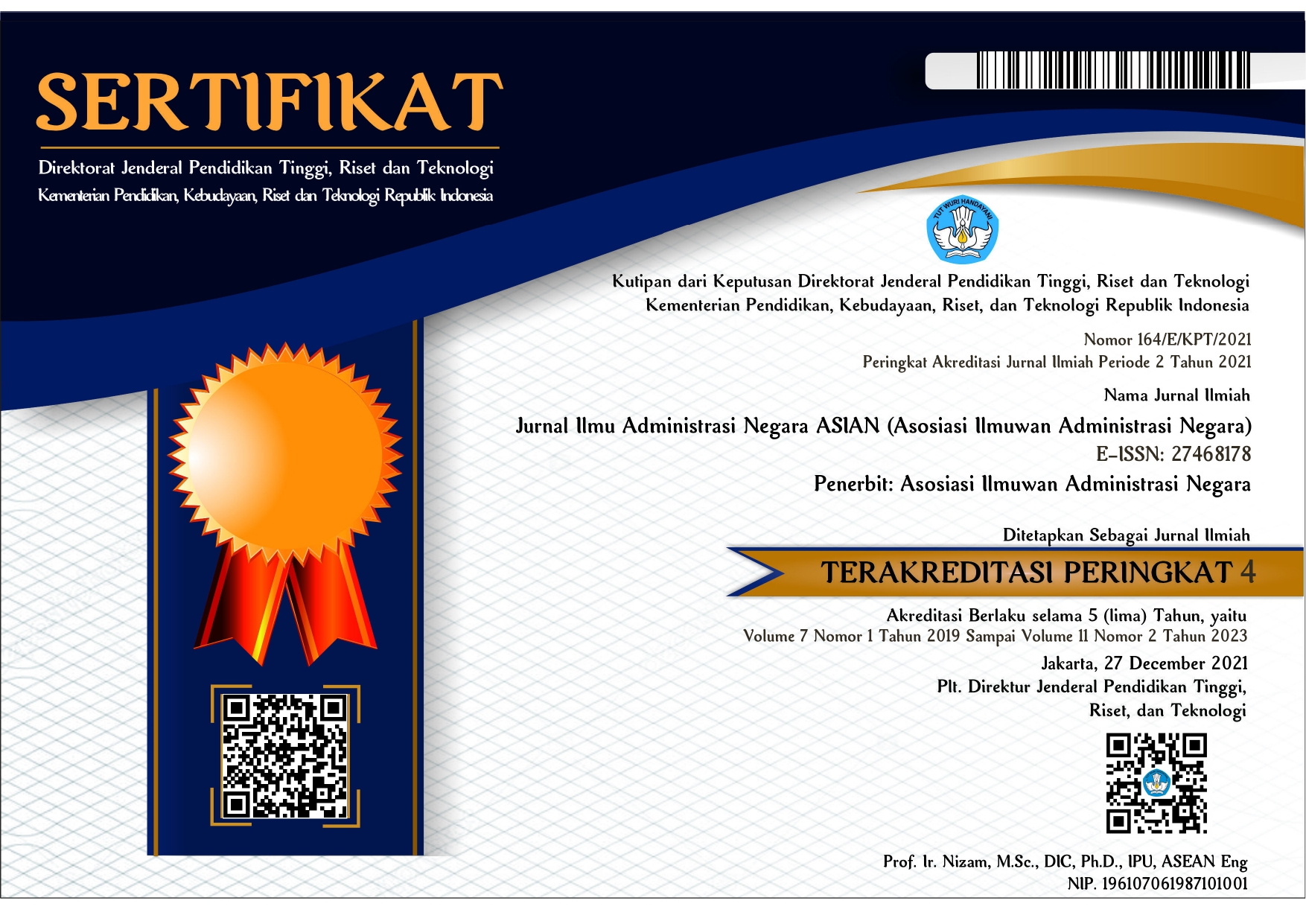Implementasi Program Koperasi Konsumen Ekonomi Syariah Roda Dua untuk Meningkatkan Kesejahteraan Masyarakat dalam Berwirausaha
 Abstract views: 333
,
Abstract views: 333
,
 PDF downloads: 261
PDF downloads: 261
Abstract
This study aims to examine the implementation of the Sharia Economic Consumer Cooperative (Kokesra) Roda Dua program by the West Sumatra Province Cooperative and MSME Office in improving community welfare through entrepreneurship, as well as identifying the obstacles faced. The method used is descriptive qualitative, with interviews and documentation studies as data collection techniques, and source triangulation as a method to verify data validity. The results showed that the West Sumatra Cooperative and MSME Agency has implemented the Kokesra program to empower MSMEs in Padang City through several steps. First, providing business capital using a profit-sharing system to MSMEs. Second, implementing savings and loan services managed by cooperative employees. However, in its implementation, there are a number of obstacles. Among others, not all MSMEs are eligible for loans, many businesses do not have official permits, and the limited budget available for the Kokesra program. This research provides an overview of the efforts that the local government has made in encouraging sharia entrepreneurship, but also highlights the challenges that need to be overcome to ensure the sustainability and effectiveness of the program in improving overall community welfare.
Downloads
References
Antara, Made dan Anderson Guntur K. 2010. Kinerja Koperasi Unit Desa di Provinsi Bali: Pendekatan Structural Equation Model. Manado: Jurusan Sosial Ekonomi Pertanian, Fakultas Pertanian, Universitas Udayana.
Bungin, Burhan. Penelitian Kualitatif Komunikasi, Ekonomi, Kebijakan Publik, dan Ilmu Sosial Lainnya. Jakarta: Prenadamedia Group, 2007
Lindiawatie dan Dhona Shahreza, “Peran Koperasi Syariah BMT BUMI Dalam Meningkatkan Kualitas Usaha Mikro”, Al-Urban:Jurnal Ekonomi Syariah dan Filantropi Islam Vol. 2, No. 1 (2018).
Machfudz, Saelany dkk.2010. Bepikir Besar dalam Koperasi. Pekalongan: PT Perintis Jasa Grafika.
Mustika, Ria, dkk. 2012. Hubungan Karakteristik Sosial Ekonomi Anggota Koperasi Dengan Pelaksanaan Prinsip-Prinsip Koperasi (Stusi Kasus: KSU Cahaya Baru, Kec. Medan Amplas, Kota Medan). Medan: Departemen Agribisnis Fakultas Pertanian, Univerristas Sumatera Utara.
Paramata, Sri Hantuti, “Peran Koperasi Annisa dalam Meningkatkan Kesejahteraan Anggota di Desa Parungi Kecamatan Boliyonto Kecamatan Gorontalo”, Jurnal Ilmu Adminisrasi, Vol. 4 No. 2 (2015)
Peraturan Deputi Bidang Pengawasan Kementerian Koperasi dan Usaha Kecil dan Menengah No.06/Per/Dep.6/IV/2016. Tentang Pedoman Penilaian Kesehatan Koperasi Simpan Pinjam Koperasi.
Permana, D. 2011. Strategi Pengembangan Koperasi Jasa Agribisnis (KOJA) STA Panumbangan Kabupaten Ciamis Propinsi Jawa Barat. [Skripsi]. Bogor: Departemen Agribisnis Fakultas Ekonomi dan Manajemen, Institut Pertanian Bogor.
Rosavinda, B. 2013. Peran Koperasi Unit Desa (KUD) Terhadap Peningkatan Pendapatan Anggota (Studi Kasus KUD "Sri Among Tani" Kecamatan Plosoklaten Kabupaten Kediri). [Skripsi]. Malang: Universitas Brawijaya.
Rosyid, Kurniawan Abdullah. 2003. “Analisis Laporan Keuangan Untuk Menilai Kinerja Keuangan Pusat Koperasi Pegawai Republik Indonesia Kabupaten Kebumen”. Skripsi. http://eprits.uns.ac.id/3500/1/6571706200905341.pdf.
Soetomo. 2011. Pemberdayaan Masyarakat. Yogyakarta: Pustaka Pelajar.
Suprayitno, Bambang. 2007. “Kritik Terhadap Koperasi (Serta Solusinya) Sebagaimana Media Pendorong Pertumbuhan Usaha Mikro, Kecil, dan Menengah (UMKM)”. Jurnal Ekonomi dan Pendidikan. Vol.4 No.2. http://Bambang-Suprayitno/Kritik-Terhadap-Koperasi-Sebagai-MediaPendorong-Pertumbuhan-UMKM/608-2036-1-PB.
Sovyana, Ria. 2012. Analisis Kesehatan Keuangan dan Non Keuangan Dalam Sistem Simpan Pinjam Pada Koperasi Wanita Mawaddah di Kabupaten Gresik. Artikel Ilmiah. STIE Perbanas Surabaya
Undang-Undang Nomor 25 tahun 1992 tentang Perkoperasian
Copyright (c) 2024 Jurnal Ilmu Administrasi Negara ASIAN (Asosiasi Ilmuwan Administrasi Negara)

This work is licensed under a Creative Commons Attribution-ShareAlike 4.0 International License.
Authors who publish with this journal agree to the following terms:
1. Copyright on any article is retained by the author(s).
2. The author grants the journal, right of first publication with the work simultaneously licensed under a Creative Commons Attribution License that allows others to share the work with an acknowledgment of the work’s authorship and initial publication in this journal.
3. Authors are able to enter into separate, additional contractual arrangements for the non-exclusive distribution of the journal’s published version of the work (e.g., post it to an institutional repository or publish it in a book), with an acknowledgment of its initial publication in this journal.
4. Authors are permitted and encouraged to post their work online (e.g., in institutional repositories or on their website) prior to and during the submission process, as it can lead to productive exchanges, as well as earlier and greater citation of published work.
5. The article and any associated published material is distributed under the Creative Commons Attribution-ShareAlike 4.0 International License








